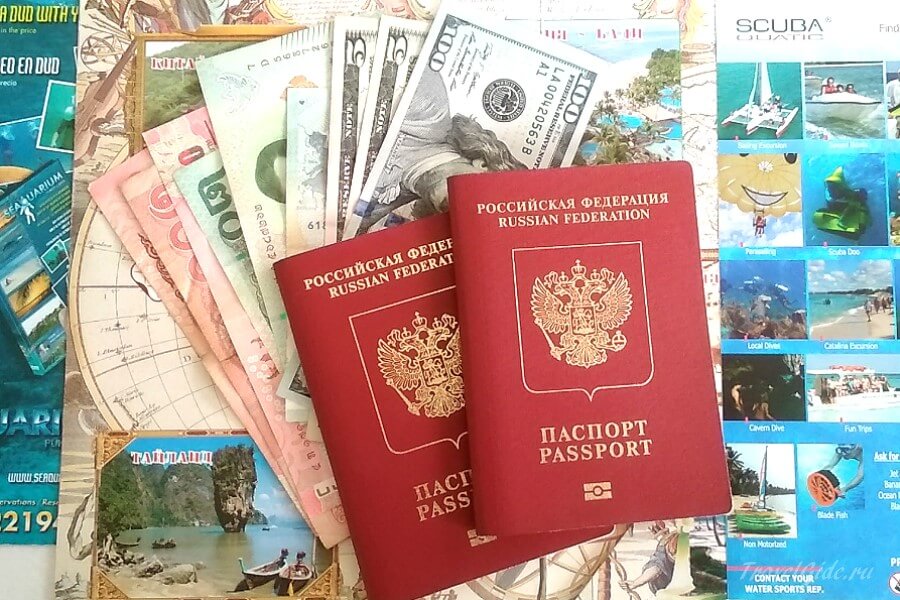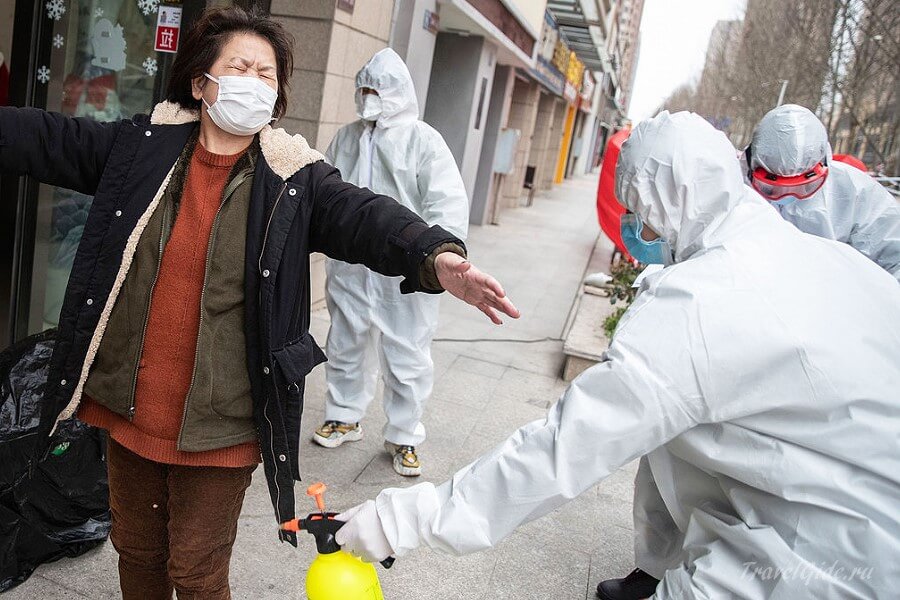
Real rights and obligations of a tourist in various situations
DOne-third of travel sites provide their readers with false information, such as prices or promotional offers. And this is just one of many surprises hiding from those who plan their holidays. What should you pay attention to when buying a trip from a tour operator or travel agent so that the long-awaited trip is not remembered as something unpleasant? Why it is important to know the rights and obligations of the tourist and what can be done when the real conditions of rest do not correspond to those that were paid?
What should a tourist be ready for - the results of the check
An audit conducted by the Federal Service for Supervision of Consumer Rights Protection and Human Welfare "Rospotrebnadzor" with the involvement of public organizations operating in the field of consumer protection revealed an unpleasant pattern.
Almost "under the microscope" 325 Internet resources were examined, which offered various prices for holidays, and allowed booking trips, tickets, hotels or renting cars. At the same time, it turned out that as many as 204 sites were misleading their potential customers.
Almost 31% of them have the final the price of the product was higherthan suggested at the beginning of the site because there were additional fees that the person interested in buying was not previously informed about.
The pricing policy or how it was calculated was unclear. In addition, on average, one in five portals tempted users with promotions that were invalidated during the booking process. In this state of affairs, the protection of the rights of tourists remains a hot topic.
These are just a few of the many challenges people face when planning a vacation trip. At the signing of the contract and during the holiday, when the offer does not meet expectations, tourists can expect a completely separate “set of problems”. In each of these situations, travel companies have obligations, and travelers have the right to demand their fulfillment.
What should I pay attention to when buying a tour?
Just before buying a tour and signing a contract, you should practically turn into a detective. It is necessary to collect as much information as possible both about the travel agency you contacted and about the specific vacation spot.
Do not worry too much about the upcoming vacation under the palm trees. At this stage, reason should prevail. Sit down at the computer and find out the opinion of people who used the services of this travel agency, read first-hand reviews about the hotel - this is often an indispensable source of information.
In addition to such basic questions as carefully reading the contract and checking the details of the travel agent and tour operator, the cost and dates of the holiday, always read the general sectioncontained in each document.
Thanks to this, unpleasant surprises can be avoided, among which, for example, a change in departure time or the requirement of a travel agency for an additional surcharge due to a sharp increase in the exchange rate can be.
Just before signing the contract, this document containing the general conditions should become your "bible".
Even if you have never read the latest, you should study the contract as if it were preparation for a serious exam. Among other things, this will help to deal with unforeseen situations and doubts, which will be discussed below.
Rights and obligations of a tourist in a situation where a travel agency requires additional payment
In an ideal situation, the cost of the tour after signing the contract cannot be changed. In reality, sometimes things are a little different. Since the price of a trip is determined by the prevailing fares, fees and exchange rates, it can realistically increase if one or more of these elements changes.
Can the agency demand additional payment for the tour from the tourist, is it legal and how to resolve this situation? This question is not entirely simple and its solution depends on several circumstances. However, there are key nuances that largely determine the result.
If the possibility of additional payments is expressly fixed in the contract
And the majority of lawyers and judicial practice are burning that it is important to have a corresponding clause in the contract or additional agreement, which directly provides for the possibility of increasing the price of the package depending on a change in a number of circumstances. It could be something like this:
In this option, by signing an agreement directly indicating the possibility of changing the price of the travel package by the trip organizer and agreeing to an additional payment, in the cases specified in the agreement, you will be required to make such payments. Especially since Article 424 of the Civil Code of the Russian Federation provides for the possibility of changing the price of the contract, if it is provided for by it.
... "St. 424 of the Civil Code of the Russian Federation: 2. Changing the price after the conclusion of the contract is allowed in cases and on the conditions provided for by the contract, the law or in the manner prescribed by law "...
Here it will not be superfluous to repeat again: read carefully what you sign. Each paragraph of any document should be clear and understandable. In addition, there is currently a practice of signing additional agreements, one of which may contain a provision on possible additional payments.
If the contract does not expressly provide for the possibility of additional payments
The option when the contract for the sale of a tourist product or additional agreements to it do not contain provisions indicating the possibility of additional payment for the tour does not mean at all that the travel agency cannot demand such an additional payment.
The fact is that Federal Law No. 132-FZ of November 24, 1996 "On the Fundamentals of Tourism Activities in the Russian Federation" expressly says that either party has the right to demand termination or amendment of the contract in the presence of a significant change in the circumstances that existed at the time of the conclusion of the contract. According to the law, these circumstances include:
... "St. 10 of the Federal Law No. 132: ... changing the timing of the trip; unforeseen growth of transport tariffs; the impossibility of making a trip by a tourist due to circumstances beyond his control”…
Moreover, the law does not explicitly state that this list is exhaustive, which makes it possible for the tour operator to try to recognize the presence of a significant change in circumstances in other cases in court.
In this issue, it is necessary to clearly distinguish between two possible scenarios that determine whether the travel agency has to demand an additional payment. According to the vast majority of lawyers, payment for the product in full, demand for additional payments for any reason unacceptable.
If the payment for the trip is divided into two payments, and the second has not yet been made, then the operator may legally demand an additional payment, of course, under the circumstances expressly specified in the Law on Tourism.
Rights and obligations of a tourist in a situation where the tour operator cancels the trip
Cases when a trip is canceled due to the fault of the tour operator, or a tourist cannot use most of the services on this tour, are not so frequent. But such facts, unfortunately, exist and no one is immune from them. Therefore, it is important to know your rights in this situation and an approximate algorithm of actions.
If the tour is canceled by the operator before it starts
You are preparing for departure, you have packed your bags and clearly know What to take to the sea. You already imagine yourself on vacation somewhere under the palm trees. But then comes the bad news - the trip is cancelled.
What to do when a travel agent tells you that your trip has been cancelled:
- To write an application for a refund. Its form is arbitrary, but requires a clear indication of the reason - non-fulfillment of its obligations by the tour operator and the inability to use the paid product;
- Submit Application on the return of funds to the recipient. It is recommended to transfer the application to the agent (with registration and a mark of receipt on the second copy). It is possible to send an application directly to the organizer of the trip, but it must be by registered mail with a notification and a description of the attachment;
- After receiving an official response expect a return Money.
A refund for a paid trip, regardless of who the application was sent to, is made through a travel agent. Moreover, it is carried out in a way similar to the initial payment: in cash or to a bank card account.
If the organizer does not respond to the application, then the collection of funds is made in accordance with a court decision. However, the pre-trial procedure for resolving such disputes is not only preferable, but also mandatory.
If problems with the tour arose during its process
In this case, we are talking about the rights of a tourist when part of the mandatory services included in the tour product is not provided. That is - flight canceled or the hotel refuses to check in. A certain discrepancy between paid services and actually received ones is a little different and more on that later.
In any case, you need to know that, according to the current legislation, it is the tour operator is responsible for the quality, completeness and compliance of the services provided to the tourist within the framework of the tour package.
... "St. 10 of Federal Law No. 132: ... the tour operator is responsible for the failure to provide or improper provision of services included in the tourist product to the tourist and (or) another customer, regardless of who should have provided or provided these services "...
The travel agent also bears a certain responsibility. But it is not related to the volume and quality of services included in the tourist package.
What is the responsibility of the travel agent to the tourist:
- For the timely transfer of paid funds for the tour to the tour operator;
- For timely informing the operator that the contract has been concluded;
- For coordinating the terms of the tour with its organizer in accordance with the wishes of the tourist.
Responsibilities and duties of an agent, among other things, are defined in standard contract approved by the Order of the Ministry of Culture of the Russian Federation of October 31, 2016 N 2386 "On approval of standard forms of an agreement on the sale of a tourist product ..."
What to do if there are problems with the tour in its process:
- When canceling a flight, check with the agent or operator about the planned replacement and its timing. In the absence of information, it is possible to independently purchase air tickets. It is recommended to record a telephone conversation;
- If you refuse to check into the hotel, check with the agent or operator for the planned replacement and its timing. In the absence of information, it is possible to independently purchase a room in the same or another hotel of a similar class;
- Upon arrival from the trip, write an application for a refund (by analogy with the procedure for the complete cancellation of the tour). Documents confirming the actual costs from the airline or hotel must be attached to it.
The tourist has the right to demand compensation and other expenses incurred by him in connection with the cancellation of the tour or part of it, up to compensation for moral damage in a pre-trial order. However, the organizer is not obliged to reimburse such costs without a court decision.
Rights and obligations of a tourist in a situation when he cannot go on a tour
In some contracts for the implementation of a travel package, and more often in additional agreements, the agencies indicate how much money you will receive back if you cancel the trip. As a rule, the closer the start date of the tour, the more you lose.
However, this item is in conflict with the law, as it infringes on the right of the client of the travel company to refuse to execute the contract unilaterally.
In a word, the operator does not have the authority to provide for any penalties for unilateral termination of the contract by the client. But this, of course, does not mean that he is obliged to pay the client the funds previously received by him during the sale of the tourist product in full.
And now very important point, which, in accordance with the law, directly affects the amount of the amount withheld when the client refuses the booked tour.
... "St. 782 of the Civil Code of the Russian Federation: 1. The customer has the right to refuse to execute the contract for the provision of services for compensation, subject to payment to the contractor of the expenses actually incurred by him "...
In addition, the possibility of unilateral cancellation of a paid tour is directly provided for by the Federal Law on Tourism Activities:
... "St. 10 of Federal Law No. 132: ... the impossibility of a tourist making a trip due to circumstances beyond his control (illness of a tourist, refusal to issue a visa and other circumstances) "...
Of course, the client has the right to refuse the paid tour, and the travel agency, in turn, has the legal right to withhold a certain amount for the paid travel package. However, this the amount cannot exceed the expenses of the travel agency incurred by it in the process of organizing the tour. Lost profits, penalties, forfeits, penalties included in the contract should not be taken into account when calculating the actual costs incurred - they are illegal.
It is also important to know that not all costs incurred by the travel agency and costs in the process of executing a specific contract with a client are borne by the client. In a controversial situation, when it comes to litigation, it is decided by the court based on the materials presented.
The actual cost itself calculated individually for each specific tour. As a rule, it depends on the terms of the cancellation, the direction of the tour and its special additional conditions.
Always remember that if this is a significant amount for you and you do not agree with the calculation, which, at your request, must be presented by the agent, you have the right to challenge it in court.
For those who want to understand in detail the nuances of the situation arising from a sudden illness of a tourist who has purchased a tour and abandoned it, it is recommended that you familiarize yourself with the information contained in Decision in case No. 2-334/2017 "On the protection of the rights of tourists". It reflects in detail all aspects related to the rights and obligations of a tourist, tour operator and travel agent. The solution is voluminous, but meaningful.
The rights of a tourist in the presence of information about the threat to the safety of life and health
Federal Law No. 2300-1 of 07.02.1992 "On the Protection of Consumer Rights" contains provisions obliging the seller to guarantee the safety of the services provided. These services include tourism services.
... "St. 7 of the Federal Law No. 2300-1: The consumer has the right to ensure that the product (work, service) under normal conditions of its use, storage, transportation and disposal is safe for life and health "...
Federal Law No. 132 of November 24, 1996 “On the Basics of Tourist Activities in the Russian Federation” describes in more detail the circumstances under which the buyer of a tour package can terminate the contract unilaterally.
... "St. 10 of Federal Law No. 132: ... has the right to demand a change or termination of the contract for the sale of a tourist product in connection with a significant change in the circumstances from which the parties proceeded when concluding the contract "...
Information about the presence in the territory (country) of a threat to the safety of health and life is the basis for a real deterioration in the conditions of the tour, enshrined in the contract. In addition, the law directly indicates the possibility of unilateral termination of the contract in such situations.
... "St. 14 of Federal Law No. 132: In the event of circumstances indicating the occurrence in the country (place) of temporary stay of tourists ... a threat to the safety of their life and health, as well as the danger of harm to their property, the tourist ... has the right to demand in court the termination of the contract for the sale of a tourist product "...
Thus, a tourist who has purchased a tour to a country whose stay has become dangerous and may threaten his life or health has the right to terminate the contract and demand a refund of the cost of the paid tour. in full.
But here comes the legitimate question: who determines the danger or safety of a country to visit. Certainly not a tourist. The Law "On the Fundamentals of Tourism in the Russian Federation" provides an answer to this question.
... "St. 14 of the Federal Law No. 132: The presence of these circumstances is confirmed by the relevant decisions (recommendations) of the federal state authorities, state authorities of the constituent entities of the Russian Federation, local governments adopted in accordance with federal laws "...
Depending on the nature of the circumstances that make visiting the country unsafe, such decisions and recommendations are made by various bodies and structures. For example, the Ministry of Foreign Affairs of the Russian Federation often acts as such a body. In the case of the threat of infectious diseases - the Federal Service for Supervision of Consumer Rights Protection and Human Welfare (Rospotrebnadzor).
The spread of the coronavirus infection Covid-19 and its strains has made many tourists think about the feasibility of planned trips abroad and paid tours. In what cases can a tourist count on a full refund of the cost of the tour?
In accordance with the information posted on the website of Rospotrebnadzor, as of March 2020, only three countries except China, were not recommended for visiting due to the threat to life and health. These countries were Italian Republic, Republic of Korea and Iran. Subsequently, the list of such countries has changed several times. It was determined by the current epidemiological situation and the potential threat from new strains of the virus.
Thus, in case of refusal of tours only to these countries, the consumer has the right to count on a full refund of the funds transferred to the agency or operator.
In case of refusal to travel to other countries, the contract is terminated on the general terms and conditions determined by the Civil Code of the Russian Federation and Federal Law No. 132. In any case, pre-trial settlement of disputes and claims is desirable.
The rights and obligations of the tourist in a situation where the actual conditions of the tour do not coincide with the contractual ones
From the window of the room, the view extends not to the sea, but to the backyard, where construction is being carried out? Instead of a wonderful huge pool with crystal clear water, you are invited to swim in a small and musty children's pool?
Of course, in any case, when the service you paid for differs from reality, you can do what you usually do by buying clothes with defects, that is, submit an application or other claim to the seller.
When purchasing a tour, the most common problems of this nature include:
- The conditions of accommodation in the hotel do not correspond to the paid ones;
- The flight does not correspond to the paid one. For example, this is the presence of unplanned transfers when booking a direct flight;
- Lack of transfer or its inconsistency;
- Lack of an accompanying guide from the operator.
Most often, travelers have complaints about the conditions of living in hotels. Actual conditions may absolutely not correspond to those that were discussed when purchasing the package.
What to do if the conditions at the hotel do not match the paid ones:
- Collect the necessary materials to attach them to the application addressed to the tour operator. Such materials can be advertising brochures received from the operator or agent, information about the hotel posted on the operator's website, on the one hand. Video, photo materials made by the recipient of services during their stay at the hotel, showing a clear inconsistency with the materials of the operator, on the other hand;
- Submit an application the operator with the requirement to compensate for the losses incurred (by analogy with the procedure for the complete cancellation of the tour), including compensation for moral damage;
- If there is no response from the tour operator within the established 10-day period, prepare and file a claim to the judicial authorities.
The law determines that it is the organizer of the trip who must prove that the service received by the tourist was of proper quality.
And last but not least. When we choose a special offer, such as "early booking" or "last minute", we retain all the same rights and obligations as a tourist in the Russian Federation, which are provided to those who bought a trip at the regular price.










Interestingly, if I get sick during a tourist sea cruise and they take me ashore, it turns out that I can demand a refund from the travel agency in proportion to the duration of the remaining vacation?
Absolutely true, because in accordance with Article 10 of the Federal Law of November 24, 1996 No. 132-FZ, you have the right to terminate or amend the contract if there is a significant change in the circumstances that existed at the time of its conclusion. And the disease of a tourist, just makes it impossible to travel, that is, it is such a circumstance. But here it is also necessary to take into account the possibility of a significant reduction in the remaining amount for lost travel services, by deducting the actual costs of the tour operator, and at the time of the cruise they may not be small at all.
Not a word was said about travel insurance. And in my opinion an extremely convenient thing. I paid not such a big amount, but sleep peacefully. In any case, you will get no less than the cost of the whole trip. You can make such insurance online in five minutes.
The issue of insurance against non-departure does not apply to the rights and obligations of the tourist in relations with the tour operator and travel agent. However, insurance can indeed cover all possible costs in some cases. At the same time, it must be clearly understood that insurance under the “All Inclusive” system is essentially not such, but only duplicates and deciphers the circumstances preventing departure specified in Art. 10 No. 132-FZ. These are insurance against visa denial, injury and treatment, loss of documents, subpoena and a number of others. As an example, we can cite the situation with travel insurance at Ingosstrakh.
Conditions: 2 people under 50, Thailand, three weeks, insurance for 70 tr. every traveler. The All Inclusive option costs 11,200 rubles. But not all reasons are included in it, but only those indicated above, with some of them with specific restrictions. So read the terms and conditions of insurance always carefully…
It is not clear, because the well-known LIMITED LIABILITY COMPANY "TOUR OPERATOR BG", aka the Biblio-Globus company, included an interesting clause in its standard tourist service agreement located on the company's website. The fifth section on the conditions for changing and terminating the contract indicates the amounts that are charged from the tourist upon termination of the contract, and the amount of these amounts is calculated as a percentage and depends on the terms of termination - the closer to the start of the tour, the more. And this percentage reaches 100%. Is this a clear violation of the law?
Indeed, the indication in the contract of penalties for its unilateral termination, as a percentage of the terms of refusal before the start of its execution in accordance with Art. 782 of the Civil Code of the Russian Federation is absolutely illegal, since in any case the amount of the withheld amount is determined only by the actual costs of the tour operator.
However, Biblio-Globus' model travel service agreement states that the amounts of such costs MAY only be calculated based on the percentages indicated. In addition, in the note to section 5 it is emphasized that these amounts are approximate and are determined, as prescribed by the civil code, in each specific case. That is, in fact, this section is NOT ABOUT ANYTHING, and serves only as a preparation for inattentive clients to realize the size of possible deductions upon termination of the contract.
At the same time, the amount of actual costs in the amount of 100% (costs from 0 to 3 days before the start of the tour) is completely bewildering. After all, the total cost of the tour, in addition to costs (refundable and non-refundable), includes the PROFIT of the operator, and it is definitely not included in the costs. And for the rest of the costs, the operator must provide a specific breakdown. If in doubt, go to court.
City travel tour company through the soft travel call center refused (a week before departure) to pay for a refund forced due to illness for an air ticket
They said, go to court, but they do not have a legal address, but only their email by correspondence in blue and telephones
And without their legal address, it is impossible to sue them.
The police refused to find them, in view of not criminal but civil law proceedings
In short, 50,000 rubles were presented to them
Who will tell you what is needed in this case, what laws to be guided by
How did you pay for the tour? Judging by the fact that you only know e-mail, in a non-cash way? If so, then you know the TIN and PSRN, and it is not at all problematic to find out the address of the recipient using the TIN and PSRN. You just need to make a request on the website egrul.nalog.ru and the information will be available.
TIN and OGRN are mandatory codes used to designate any business entity. Without them, doing business is not possible.
If you paid in cash, then you should have a receipt or a credit note on hand, which contains all the necessary information ...
In any case, even if you have paid for the tour and are not able to establish the legal address of the agent, you have the opportunity to file an application with law enforcement agencies. And they do not have the right to accept your application.
In addition, a good way out of this situation would be to involve a competent lawyer at the place of residence in the case, because the circumstances of the cancellation of the tour, described by you, clearly indicate the illegal actions of the travel agent.
Tui's company, when selling a tour in a form with selection conditions filters, indicated that the tour was on a regular flight (there is a screenshot). We chose from the drop-down list of tours necessary by date and type of room, paid for the ticket. In the column with the flight, AK, flight number and time are indicated (there is a photo)
Tickets arrived 14 days before departure. Having contacted the airline for information about the terms of the upgrade, it turned out that the flight was a charter one (there is a photo of the answer). There was no information about the charter at the time of booking, nor in the specification for the contract (the contract is also in hand).
To Tui's claim, they answered that they would return the money minus 30%, the fact that we were misled by selling the charter under the brand name of the regular season is completely ignored. All answers come down to the fact that either fly with what they give or refuse to take 70% from the amount of payment. We do not categorically consider the option with a charter.
We are ready to go to court, but it is not clear what to do, given that yes, there are 13 days left of departure, and during this time they will not even have time to set the date of the first hearing, and there is no possibility to postpone the vacation.
In accordance with Article 10 of the Federal Law of March 2, 2016 N 49-FZ, each of the parties has the right to demand a change or termination of the contract for the implementation of the tour. product in connection with a significant change in the circumstances from which the parties proceeded when concluding it. It is these significant changes in circumstances that include the deterioration of the travel conditions specified in the contract.
But firstif the contract provides for the possibility of changing (replacing) the time of departure or flight, then the tour operator has carried out actions within the framework of the existing contract (the specification is important, but the main provisions are no less significant than it).
And secondly, does the contract indicate that your specific travel product provides for an exclusively scheduled flight? Is it written in the main part of the contract?
If there is the first or not the second, then it will be somehow difficult to challenge the actions of Touristik Union International.
Remember that you have a need to prove that the replacement of a regular flight with a charter one has become a deterioration in the conditions of your planned trip for you. The fact is that a charter flight MAY actually be worse than a regular flight in certain criteria, but it may not differ in basic characteristics.
In your situation, if you cancel the charter and, accordingly, cancel the tour, the planned vacation will definitely be spoiled and, quite possibly, the judicial appeal of the TUI Group decision will eventually become a big negative and cost a lot of financial investments.
Anyway the size of the withholding amount is determined only by the actual costs of the tour operator and 30 % non-returns must be documented.
You can first contact the public reception of the Federal Agency for Tourism for advice on the current situation at russiatourism.ru/feedback/ or call the hotline. Rostourism, together with the Tourist Assistance Association, organized the work of a “hot line” for tourists at the phone number +7-499-678-12-03. Working hours of the "hot line" from 09-00 to 21-00 Moscow time.
Hello! On February 15, 2020, we purchased an excursion tour from the TUI tour operator "Mediterranean Tale" at the Orange Travel agency. In connection with the quarantine in Italy yesterday, 03/10/2020, we received a printout of the trip. And they were unpleasantly surprised by the lack of paid excursions! Made a claim. Our departure on a tour package on 14.03! As a result of comparisons, already at home, we found out that we were issued a tour "Mediterranean fairy tale light", which does not provide for excursions, they are paid separately during the trip. At the same time, the girl in the agency did not try to correct us, which means she deliberately misled us. We definitely could not know that there is a light version. We discussed a full-fledged excursion program! How can we be in such a situation? Is it possible for us to return the money?
Hello! It will be extremely difficult to prove the deliberate misleading of the client (in the absence of any material and other evidence). The presence of video or audio recordings of the dialogue or the testimony of witnesses would be taken into account by any court. But in their absence, only the recognition of an agency employee that she deliberately kept silent about the “light” version of the product will be proof of your words.
Given the practice of such cases, the agency can only submit to the court a certified copy of the contract for the sale of a tourist product and declare that the claim is being considered in the absence of the defendant.
In such a situation, only documented fixed provisions of the contract you signed are the source of dispute resolution (that is, what exactly did you pay for - what services). If the presence, number and types of excursions are precisely indicated in the contract or in its appendix, then, without a doubt, their actual absence is a significant change in the terms of the contract. In this case, the purchaser of the product may demand termination of the contract due to the tour operator's failure to fulfill its obligations or a commensurate reduction in the cost of the product as a whole.
Otherwise (if the contract or the annex does not specify excursions with their number, type and duration), claims against the travel agency and the tour operator do not have any legal basis. In a word, all possible claims on your part in this case can be based only on the provisions of the contract.
Due to the rapid spread of the coronavirus and taking into account the age of the tourist (61 years old), is it possible to legally refuse a tour to the UAE, which is to take place on March 28, with a full refund of the tour cost? The tour has been paid in full. I'm afraid for the flight itself - the cabin is a limited space, and if you fly on the same flight with a carrier of the virus, then you can either end up in quarantine instead of rest, or in the next world, which you wouldn't want to)) And another question: if the tour is paid, then if you refuse trips what expenses does the travel agent bear?
Hello! Article 14 of the law "On the basics of tourism activities in the Russian Federation" says:
“In the event of circumstances that indicate the occurrence in the country ... of a threat to the safety of their life and health, as well as the danger of harm to their property, the tourist ... has the right to demand in court the termination of the contract for the sale of a tourist product or its change”
That is, if there is a threat to life and health, you have the right to demand (in court) the termination of the contract and the return of the entire amount (100%) paid under the contract. The official representatives of Rospotrebnadzor adhere to the same position (100% return), which is also not unimportant.
However, there is one significant BUT. The aforementioned law 132-FZ law tells us that the existence of a threat must be confirmed. Literally like this:
"The presence of these circumstances is confirmed by the relevant decisions (recommendations) of the federal state authorities, state authorities of the constituent entities of the Russian Federation, local governments adopted in accordance with federal laws"
According to the official recommendation for today, in addition to PRC, only three countries are included in the list of such "dangerous" countries. This Italian Republic, Republic of Korea and Islamic Republic of Iran. Only tours to these countries allow the tourist to cancel the planned trip, terminate the contract and return their money in FULL. More information (official recommendation) can be found on the RPN website at the link: rospotrebnadzor.ru/about/info/news/news_details.php?ELEMENT_ID=13821&sphrase_id=2002717
Thus, in your case, the cancellation of the tour with a full refund of the payment made is not possible. However, at any time you have the right to terminate the contract in accordance with the provisions and on the terms provided for by the Civil Code of the Russian Federation and receive a part of the paid funds minus the reasonable expenses of the tour operator and agent (as discussed in the article above).
03/19/2020 at 22:53 on the official website of the Federal Agency for Tourism (Rostourism) a message was posted: "RECOMMENDATIONS ON DEPARTURE". This post says:
“In connection with the ongoing global spread of coronavirus infection, the Decree of the Chief State Sanitary Doctor of the Russian Federation requires all persons arriving in Russia from abroad, including from places of recreation, to undergo a two-week self-isolation, starting from the day of arrival.
In addition, more and more countries popular for tourists are introducing restrictive measures for the reception of foreign citizens. A number of countries also restrict movement in their territories by taking quarantine measures.
At the same time, most countries take these measures without prior notice, creating inconvenience and risks when spending holidays and returning tourists home.
In this regard, Rostourism recommends:
- citizens of Russia, if possible, temporarily refrain from traveling outside the Russian Federation until the epidemiological situation normalizes;
Can the above recommendation of the Federal Tourism Agency be considered confirmation of the relevant decisions (recommendations) of the federal government bodies and is reliable evidence of the occurrence of circumstances that are, by virtue of Art. 14 of the Federal Law "On the Fundamentals of Tourism in the Russian Federation" as a basis for terminating the contract on the basis of this recommendation ???
Such a recommendation was published, but it was, as it were, of a completely “recommendatory” nature, which did not carry legal consequences, and should not be taken by tourists as a basis for refusing a tour and requesting a refund of the entire amount of funds paid without deducting the operator’s FPR. In order to be convinced of this, read the subsequent published information of Rostourism dated March 23 of this year. It still has the same four countries. (russiatourism.ru/news/16620/)
INFORMATION FOR TOURISTS ON APPEALS OF CITIZENS ON 03/23/2020
In connection with the difficult epidemiological situation in the world, Rostourism, in order to ensure that both organized and independent Russian tourists are informed, informs the following.
At the moment, Rostourism does not recommend visiting the following countries due to the security threat regime:
- from 01.24.2020 - People's Republic of China - recommendation of the Federal Tourism Agency of 01.24.2020
– from 27.02.2020 – Italian Republic, Republic of Korea, Islamic Republic of Iran – recommendation of Rostourism dated February 27, 2020.
Good afternoon.
Tour to the UAE from March 22-25. Paid in full.
The UAE is a high-penalty state. The AGENCY reported 100% fine for the ticket and for the tour, the reasonable expenses are very high.
Can a sick leave somehow save the situation?
Cancellation of the tour with a full refund of the payment made is not possible. What documents need to be sent to the tour operator?
Thank you
Good afternoon Please tell me the best way to deal with the situation. We purchased a tour to Vietnam, departure 03/21/2020. An agreement was concluded with a travel agency, tour operator "Pegasus". 18.03. The travel agent told us that the flight had been cancelled. We wrote a statement about the termination of the contract and the return of funds, in connection with the cancellation of the flight. 19.03. the travel agent said that there are two options: cancel the contract with the FPR (i.e. they will withhold part of the cost of the tour from us) or the paid funds remain on deposit with the tour operator and we will be able to choose another tour within 2 years, if we do not do this - money will return only after 12/31/2021 (after 1.5 years!). How legal is this and what actions should we take? In fact, the service was not provided to us, the flight was canceled.
Good afternoon. Tell me what to do: we bought and fully paid for a tour to Cyprus in June. But due to quarantine, exams are moved, and you won’t be able to fly at another time. How to cancel the tour if, against the backdrop of events, the tour operator refuses to return the money?
In short, then write a statement to the operator and, if you refuse to sue (although in many regions the filing of applications for cases of this nature and meetings on them are suspended).
The fact is that different operators make different statements. For example, the Civil Aviation Department of Thailand has introduced restrictions indicating that all arrivals in the Kingdom must be quarantined or isolated (from March 22, 2020), have insurance of at least 100 thousand dollars and a certificate of absence of coronavirus.
In this situation Biblio Globus announced the decisionreturn money for tours with flights by Rossiya airline to customers in full”, within 20 days from the date of submission of the return application. A Pegas Tourism, announcing the cancellation of tours to all foreign destinations in the period from March 23 to April 20, 2020, offers reschedule travel dates and use the payment already made for tours to purchase any tour product of the company until December 31, 2021.
This example only shows that operators can make various statements determined by the company's policy, but no one has canceled the solution to any situation in the legal field. And any court is based not on the statements of the operator, but on the rule of law.
Once again: you have the right to demand termination of the contract at any time, especially in connection with a significant change in the circumstances from which you proceeded when concluding the contract (Article 10 of the Federal Law No. subject to payment to the contractor of the expenses actually incurred by him (Article 782 of the Civil Code of the Russian Federation “Unilateral refusal to execute the contract for the provision of services for compensation”). Actual expenses include only documented and proven costs, but not all of which the operator usually counts (for example, hotel accommodation paid in advance by the operator is not included in such costs, there are other nuances).
I heard that payments will be made from the personal responsibility fund (FPO) of the tour operator to tourists who could not go on tours to “closed” countries due to the pandemic. Is it possible to get them and when?
Decree of the Government of the Russian Federation No. April 8, 2020 #461 The rules for the return of money paid for a tourist product from the tour operator's personal liability fund have been approved.
These rules were approved in order to provide support to tour operators in the field of outbound tourism due to the difficult economic situation caused by the spread of a new coronavirus infection, as well as to protect the rights of consumers of the tourist product. The Decree establishes the procedure and conditions for the return to tourists or other customers of the amounts paid by them for a tourist product from the funds of the tour operator's personal responsibility fund.
To receive funds from the FPO, the operator must by April 15 submit notifications of intent to use the funds of the fund.
However, as the RTS explained, their plans are unlikely to please tourists. During six months it is planned to compile a list of those who will receive the money back. And they will be paid within two months.
The PCT noted that FPO funds of the tour operator may not be enough for all: then customers will receive a part of the cost of the tour.
Thank you, it seems that a lot has fallen into place, but still, with the current situation, due to the virus, a lot is somehow incomprehensible.